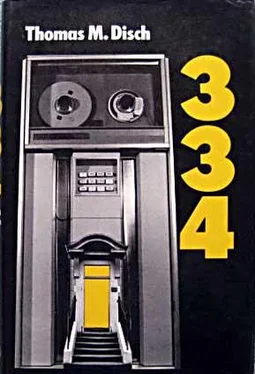It was the garbage bell. Had she remembered? She rose and rounded the bend of corridor into the kitchen just as the platform inside the shaft dropped. Bags from 7 and 8 came down the chute, rattling, and far below, muffled, it all smashed together into the smasher. But her own garbage was still waiting in the pail, unsorted and unwrapped.
Let it, she thought. She tried to return to the villa, closing her eyes and clutching for the talismanic image that would place her there: a wedge of sunlight, a window, sky, and the slight sway of the pine.
Alexa was reclining on the double bed. Timarchus knelt before her, head bowed (he was a new boy, Sarmatian, and rather shy), offering his mistress, on a scalloped tray, a small cake covered with pineae. (She was hungry.) “But I won’t touch it,” she told herself.
To Timarchus she said: “This afternoon when the bailiff can spare you, my boy, go down by the pool with a rag and rub the statue where it’s stained. Ever so gently, you know, just as though the stone were skin. It will take days, but—” She sensed that there was something wrong with the boy.
A smile. “Timarchus?”
He raised his head in answer: the olive skin formed two small, smooth hollows where eyes would have been.
It wouldn’t do. She ought to have known better by now than to try to bull her way through once she’d lost contact. The result was inevitably nightmares and silliness.
She set to work. It was, anyhow, nearly three o’clock. She spread a page of the Times across the counter and emptied the pail over it. A story in the second column caught her attention: a plane had been stolen from the Military Fair at Highland Falls. Apparently it had been flown away. But why? To have found out she would have had to brush aside a skum of eggshell, peelings, paper, sweepings, and a week’s worth of shit and husks from Emily’s cage.
Actually, she was not that curious. She made a tiny bundle, over and under, around and under once more, the only skill surviving from her flirtation with origami twenty years before. Her Japanese instructor, with whom she had also conducted a flirtation, had had to agree to a vasectomy as a condition of entering the U.S. It left the tiniest scar. His name was Sebastian… Sebastian… His last name escaped her.
She put the bundle on the platform.
She stopped in the doorway to untie, strand by strand the knot of muscle from her forehead down to her shoulders. Then four deep breaths. Noises seeped into this brief stillness: the icebox, the higher pitched purr of the filter, and, intermittently, a grinding whine that she had never understood. It seemed to come from the apartment overhead but she never remembered to ask what it might be.
Was there somewhere she was supposed to have gone?
This time it was the timer. Willa’s pies had a fine glaze. Alexa had used one of her own (real) eggs to brush the crust, a courtesy that would probably be invisible to Willa, who was capable of only the broadest gastronomic distinctions, as between beef and ice cream. The casserole squeezed in beside the rice pudding she was doing for Larry and Tom, who, lacking an oven of their own, paid for their time in Alexa’s with tickets to the opera from their subscription series, an informal, inflexible contract of many years’ standing. She closed the door, reset the timer, rewound and unplugged the instruction cassette.
And that, except for the mail, was that.
The key was in the penny dish, and the elevator, god bless it, was alive and well and only one floor off. Plotting how in coming up she would escape them by reading her mail, she read the graffiti going down: obscenities, the names of politicians, and everywhere (even the ceiling) “love,” which some patient cynic edited, each time it was scratched into the paint, to “Glove.” the super’s endearing theory was that this was all the work of lumpen-prole delivery men, the residents themselves being too well-bred and status-conscious to muck up their own walls. Alexa had her doubts about this, since she’d added her own tiny “shit” coming home drunk last year from her section’s Xmas party. There it was, just below the cloudy plastic cover of the Inspection Certificate, as humorless now, as ineloquent as all the rest. the doors opened, stuck, strained, and opened all the way.
The mailman was just beginning to stuff the boxes, so she said “Hello, Mr. Phillips,” and asked the polite question or two from her standard casework repertoire of family, weather, teevee. Then she went out to the street and tested the air. It was palatable, but beyond that something suddenly seemed wonderfully right.
A sky of curdled cloud, a bit of breeze that flapped the fringe of the canopy. As it moves from a smaller to a larger space, an answering expansion of the spirit. The concrete swept clean. And?
She only realized what the wonder had been when it was taken from her: out of the third brownstone in the row across the street a woman wheeled a baby buggy. She had been alone.
The buggy descended to the pavement at a controlled jounce and was steered inexorably toward Alexa.
The woman (whose hat was exactly the same dismaying brown as the inside of the elevator) said, “Hello, Mrs. Miller.”
Alexa smiled.
They talked about babies. Mr. Phillips, who had finished up inside, told them about the preciosities of the two younger Phillipses: “I asked them what the dickens it was, a leaky sieve or what—”
It came to her, where she was supposed to be. Loretta had phoned last night when she was half asleep and she hadn’t written it down. (Loretta’s middle name was Dickens, and she claimed, in some complicated way, to be a descendant.) The appointment was for one o’clock and the Lowen School was on the other side of town. Panic whelmed up. It couldn’t be done, she told herself: and the panic subsided.
“Do you know what it turned out to be?” Mr. Phillips insisted.
“No, what?”
“A planetarium.”
She tried to think what this could possibly mean. “That’s astonishing,” she said and the woman who had known her name agreed.
“That’s what I told my wife later—astonishing.”
“A planetarium,” Alexa said, as she retreated toward the mailboxes. “Well, well.”
There was the winter number, one season overdue, of Classics Journal; a letter with a Burley, Idaho, postmark (from her sister Ruth); two letters for G., one from the Conservation Corporation that was probably an appeal for funds (as, with equal probability, Ruth’s letter would be); and the crucial letter from Stuyvesant High School.
Tank had been accepted. He didn’t have a scholarship but that, considering G.’s income, was only to be expected.
Her first reaction was sodden disappointment. She had wanted to be relieved of the decision and now it was squarely before her again. Then, when she realized she’d been hoping Stuyvesant would refuse him, she felt as sodden guilt.
She could hear the phone ringing from the elevator. She knew it would be Loretta Couplard wanting to know why she’d missed their appointment.
She used the wrong key for the top lock. “My house is on fire,” she thought, “and my children are burning.” (And, as a kind of appendix to this thought: Have I ever seen a ladybug alive? Or only pictures of them on nursery-rhyme cassettes?)
It was a wrong number.
She settled down with the Classics Journal, which had gone, as everything did these days, from paper to flimsy. An article on the Sibyl in the Satyricon; a compendium of the references in Aristotle’s Poetics; a new method of dating the letters of Cicero. Nothing she could use for therapy.
Then, with a mental squaring of her shoulders against her sister’s devious demands, she began the letter:
March 29, 2025 Dear Alexa—
Читать дальше












